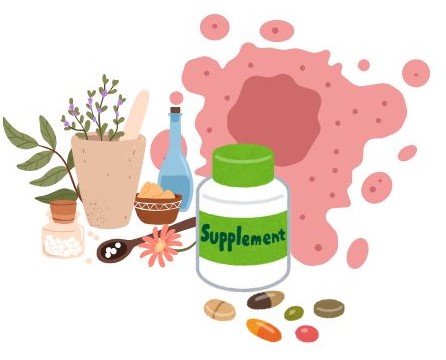Cancer is a complex disease that requires a multifaceted approach to treatment and management. While conventional therapies like surgery, radiation, and chemotherapy are fundamental in treating cancer, dietary supplements are increasingly being explored for their potential supportive roles. This article will cover some of the most studied supplements and their mechanisms of action.
1. Vitamin D
Overview of Vitamin D
Vitamin D is a fat-soluble vitamin that plays a crucial role in various bodily functions, including calcium metabolism, immune function, and cell growth regulation. It can be obtained through sunlight exposure, certain foods, and supplements.
Mechanisms of Action
- Cell Growth Regulation:
- Vitamin D influences cell differentiation and proliferation. It helps regulate the cell cycle, promoting normal cell growth while inhibiting uncontrolled cell division, which is a hallmark of cancer.
- Apoptosis Induction:
- Vitamin D can promote apoptosis (programmed cell death) in cancer cells, helping to eliminate cells that may become malignant. This process is crucial for maintaining healthy tissue and preventing tumor development.
- Immune System Modulation:
- Vitamin D plays a significant role in immune function. It enhances the innate immune response, helping the body to recognize and attack cancer cells. Adequate levels of vitamin D may also reduce inflammation, which is linked to cancer progression.
- Inhibition of Angiogenesis:
- Vitamin D may help inhibit angiogenesis, the process by which tumors develop their blood supply. By limiting blood vessel growth, vitamin D can restrict the nutrients and oxygen available to tumors, potentially slowing their growth.
- Genomic Stability:
- Vitamin D can influence gene expression by binding to the vitamin D receptor (VDR) in various cells, including cancer cells. This interaction can lead to changes in the expression of genes involved in cell growth, differentiation, and immune responses.
Recommended Intake
The recommended dietary allowance (RDA) for vitamin D varies by age, sex, and life stage, but general guidelines suggest:
- Adults (19-70 years): 600 IU (15 mcg) per day
- Adults (71 years and older): 800 IU (20 mcg) per day
Sources of Vitamin D
- Sunlight: The body synthesizes vitamin D when the skin is exposed to sunlight.
- Dietary Sources: Fatty fish (like salmon and mackerel), fortified dairy products, egg yolks, and fortified cereals.
- Supplements: Vitamin D3 (cholecalciferol) is generally preferred for supplementation.
While research suggests that vitamin D may play a beneficial role in cancer prevention and management, it is essential to approach supplementation with caution. Maintaining adequate vitamin D levels through a combination of sunlight exposure, diet, and supplements can contribute to overall health and may offer protective benefits against certain cancers. As always, consulting with a healthcare provider is crucial for personalized recommendations and monitoring.
2. Omega-3 Fatty Acids
Omega-3 fatty acids are essential fats that the body cannot produce on its own. They must be obtained from the diet. The main types include:
- Alpha-linolenic acid (ALA): Found in plant sources like flaxseeds, chia seeds, and walnuts.
- Eicosapentaenoic acid (EPA): Found in fatty fish such as salmon, mackerel, and sardines.
- Docosahexaenoic acid (DHA): Also found in fatty fish, DHA is crucial for brain health and development.
Mechanisms of Action
- Anti-Inflammatory Effects:
- Omega-3 fatty acids have potent anti-inflammatory properties. Chronic inflammation is a known risk factor for cancer, and reducing inflammation can help lower the risk of developing cancer or slowing its progression.
- Modulation of Cell Signaling:
- Omega-3s can influence cell signaling pathways involved in cancer development, including those related to cell proliferation, apoptosis (programmed cell death), and metastasis (the spread of cancer cells).
- Inhibition of Tumor Growth:
- Some studies suggest that omega-3 fatty acids can inhibit the growth of tumor cells by affecting their metabolism and signaling, leading to reduced cancer cell proliferation.
- Enhanced Immune Response:
- Omega-3 fatty acids may enhance the immune system’s ability to identify and eliminate cancer cells, contributing to improved overall immune function.
- Alteration of Tumor Microenvironment:
- Omega-3s can influence the tumor microenvironment, potentially making it less favorable for cancer development and growth by reducing inflammation and promoting apoptosis.
Recommended Intake
Health organizations typically recommend consuming at least two servings of fatty fish per week, which equates to about 500 mg of EPA and DHA per day for general health. For specific cancer prevention or management, higher doses may be suggested under medical supervision.
Sources of Omega-3 Fatty Acids
- Fatty Fish: Salmon, mackerel, sardines, herring, and trout.
- Plant Sources: Flaxseeds, chia seeds, walnuts, and hemp seeds.
- Algal Oil: A plant-based source of DHA, suitable for vegetarians and vegans.
- Supplements: Fish oil and algal oil capsules can provide concentrated doses of omega-3s.
Omega-3 fatty acids may offer protective benefits against certain types of cancer through their anti-inflammatory properties, modulation of cell signaling, and enhancement of immune function. While more research is needed to fully understand their role, incorporating omega-3-rich foods into the diet can be part of a holistic approach to health and cancer prevention. As always, consulting with a healthcare provider is essential for personalized recommendations.
3. Curcumin
Curcumin, the active compound found in turmeric, has gained attention for its potential anti-cancer properties. Here’s an in-depth look at how curcumin may help in the fight against cancer:
Overview of Curcumin
Curcumin is a polyphenolic compound that gives turmeric its yellow color. It has been used in traditional medicine for centuries, particularly in Ayurvedic practices, due to its anti-inflammatory, antioxidant, and antimicrobial properties.
Mechanisms of Action
- Anti-Inflammatory Effects:
- Curcumin inhibits various inflammatory pathways, including the nuclear factor-kappa B (NF-kB) signaling pathway. Chronic inflammation is a significant risk factor for cancer, and reducing inflammation can help lower the risk of cancer development and progression.
- Antioxidant Properties:
- Curcumin acts as a powerful antioxidant, neutralizing free radicals and reducing oxidative stress. Oxidative stress can lead to DNA damage, contributing to cancer development.
- Modulation of Cell Cycle:
- Curcumin can influence the cell cycle by promoting cell cycle arrest in cancer cells, preventing them from proliferating uncontrollably.
- Induction of Apoptosis:
- Curcumin promotes apoptosis (programmed cell death) in cancer cells, which is crucial for eliminating cells that may become malignant. It affects various apoptotic pathways, increasing the likelihood that cancer cells will self-destruct.
- Inhibition of Tumor Growth and Metastasis:
- Research indicates that curcumin can inhibit tumor growth and metastasis by affecting pathways involved in angiogenesis (formation of new blood vessels) and invasion. By limiting the supply of nutrients and oxygen to tumors, curcumin can slow their growth.
- Gene Expression Modulation:
- Curcumin can modulate the expression of various genes involved in cancer progression, including those related to inflammation, apoptosis, and metastasis.
Recommended Intake
While there is no established RDA for curcumin, studies typically use doses ranging from 500 mg to 2,000 mg per day in supplement form. It’s essential to consider that curcumin is poorly absorbed in the gastrointestinal tract, so taking it with black pepper (which contains piperine) can enhance its bioavailability.
Sources of Curcumin
- Turmeric: The primary dietary source, commonly used as a spice in cooking.
- Curcumin Supplements: Available in various forms, including capsules, powders, and extracts.
- Turmeric Tea: Brewed from fresh or dried turmeric, can be consumed for health benefits.
Potential Risks and Considerations
- Digestive Issues:
- High doses of curcumin may cause gastrointestinal discomfort in some individuals, including bloating and diarrhea.
- Interactions with Medications:
- Curcumin can interact with certain medications, including blood thinners and drugs metabolized by the liver. Consultation with a healthcare provider is essential before starting supplements.
- Not a Substitute for Conventional Treatment:
- While curcumin shows promise, it should not replace conventional cancer treatments. It may serve as a complementary therapy but should always be discussed with a healthcare professional.
Curcumin has potential anti-cancer properties due to its anti-inflammatory, antioxidant, and apoptosis-inducing effects. While research is promising, more studies, particularly clinical trials in humans, are needed to fully understand its efficacy and safety. Including curcumin in the diet or through supplements may provide health benefits, but it should be approached as part of a comprehensive cancer prevention or treatment plan.
4. Green Tea Extract
Green tea extract is often highlighted for its potential role in cancer prevention and management due to its rich composition of beneficial compounds. Here’s an overview of how green tea extract may help in the fight against cancer:
Key Components
- Polyphenols:
- Green tea is particularly high in catechins, a type of polyphenol. The most studied catechin is epigallocatechin gallate (EGCG), which is believed to play a significant role in its health benefits.
- Antioxidants:
- The antioxidants in green tea help neutralize free radicals, reducing oxidative stress in the body. This is important because oxidative stress can damage DNA and contribute to cancer development.
Mechanisms of Action
- Anti-Inflammatory Effects:
- Green tea extract may help reduce inflammation, which is associated with various cancers. By modulating inflammatory pathways, it may lower the risk of cancer progression.
- Inhibition of Tumor Growth:
- Certain compounds in green tea extract can inhibit the proliferation of cancer cells, potentially slowing down or stopping tumor growth.
- Promotion of Apoptosis:
- Green tea extract may encourage apoptosis (programmed cell death) in cancer cells, which is a crucial mechanism for eliminating abnormal cells that could develop into tumors.
- Modulation of Cell Signaling:
- The components of green tea extract can influence various cellular signaling pathways that regulate cell cycle, growth, and survival, potentially making cancer cells more vulnerable to treatment.
- Prevention of Angiogenesis:
- Green tea extract may inhibit angiogenesis, the process by which tumors develop new blood vessels to supply their growth. By limiting blood supply, it can restrict tumor growth.
- Support of Immune Function:
- Green tea extract may enhance the immune system’s ability to identify and eliminate cancer cells, contributing to overall immune health.
Usage and Considerations
- Forms of Consumption:
- Green tea extract is available in various forms, including capsules, powders, and as an ingredient in beverages. Drinking brewed green tea is also beneficial.
- Dosage:
- It’s important to follow recommended dosages when using supplements, as excessive intake can lead to side effects.
- Complementary Role:
- While green tea extract may provide supportive benefits, it should be considered a complementary approach alongside conventional cancer treatments.
In summary, green tea extract may help fight cancer through its antioxidant properties, anti-inflammatory effects, and ability to influence cellular mechanisms. Integrating it into a balanced diet can be a positive step towards overall health and wellness.
5. Probiotics
Probiotics are beneficial bacteria that can positively impact gut health and overall well-being. Here’s how probiotics may help in the fight against cancer:
Key Mechanisms of Action
- Gut Health Support:
- Probiotics help maintain a balanced gut microbiome, which is essential for healthy digestion and nutrient absorption. A healthy gut can support the body’s natural defenses against disease, including cancer.
- Immune System Enhancement:
- Probiotics can boost the immune system by stimulating the production of immune cells and enhancing the body’s ability to respond to infections and malignancies. A strong immune system can better identify and eliminate cancer cells.
- Anti-Inflammatory Effects:
- Probiotics can help reduce inflammation in the body. Chronic inflammation is associated with cancer development, so managing inflammation may lower the risk of certain cancers.
- Metabolism of Carcinogens:
- Some probiotics can help metabolize and detoxify harmful substances in the gut, potentially reducing the exposure of intestinal cells to carcinogens and lowering cancer risk.
- Production of Short-Chain Fatty Acids (SCFAs):
- Probiotics can produce SCFAs during the fermentation of dietary fibers. SCFAs have been shown to have protective effects on the colon and may promote the health of colon cells.
- Support for Treatment Tolerance:
- For individuals undergoing cancer treatments like chemotherapy, probiotics may help mitigate side effects such as gastrointestinal distress, potentially improving treatment tolerance.
- Regulation of Hormones:
- Probiotics can influence the metabolism of hormones, such as estrogen, which is linked to certain types of cancers, particularly breast cancer. This modulation may help reduce hormone-related cancer risks.
- Potential Anti-Cancer Compounds:
- Some probiotic strains may produce substances that have anti-cancer properties, including antimicrobial peptides and substances that can inhibit tumor growth.
While probiotics are not a standalone treatment for cancer, they may contribute to overall health and support the body’s defenses against cancer through various mechanisms. Maintaining a healthy gut microbiome with probiotics can be a valuable part of a holistic approach to wellness and disease prevention.
6. Coenzyme Q10 (CoQ10)
Coenzyme Q10 (CoQ10) is a compound that plays a crucial role in cellular energy production and acts as a powerful antioxidant. Here’s how CoQ10 may help in the fight against cancer:
Key Mechanisms of Action
- Energy Production:
- CoQ10 is essential for the production of adenosine triphosphate (ATP), the energy currency of cells. Cancer cells often have high energy demands, and CoQ10 may support healthy cellular function and energy balance.
- Antioxidant Properties:
- As a potent antioxidant, CoQ10 helps neutralize free radicals and reduce oxidative stress. This can protect cells from damage and may help prevent mutations that could lead to cancer development.
- Cellular Defense:
- CoQ10 supports the integrity of cell membranes and contributes to cellular repair processes. This can be particularly important in maintaining healthy cell function and preventing the proliferation of damaged cells.
- Immune System Support:
- CoQ10 may enhance immune function by promoting the activity of immune cells. A robust immune response is vital for recognizing and eliminating cancer cells.
- Regulation of Apoptosis:
- CoQ10 may influence the process of apoptosis (programmed cell death), encouraging cancer cells to undergo self-destruction while supporting the survival of healthy cells.
- Improvement of Treatment Tolerance:
- For individuals undergoing cancer treatments such as chemotherapy, CoQ10 may help mitigate some side effects, such as fatigue and oxidative damage, potentially improving overall quality of life during treatment.
- Support for Cardiovascular Health:
- Since many cancer patients face cardiovascular challenges, CoQ10’s role in supporting heart health may indirectly benefit cancer patients by promoting overall well-being.
Coenzyme Q10 may provide supportive benefits in the fight against cancer through its roles in energy production, antioxidant defense, immune support, and the regulation of cellular processes. While it should not replace conventional cancer treatments, CoQ10 can be part of a comprehensive approach to health and wellness.
7. Resveratrol
Resveratrol is a natural compound found in certain plants, particularly in the skin of red grapes, berries, and peanuts. It has gained attention for its potential anti-cancer properties. Here’s how resveratrol may help in the fight against cancer:
Key Mechanisms of Action
- Antioxidant Activity:
- Resveratrol acts as a powerful antioxidant, helping to neutralize free radicals and reduce oxidative stress. This can protect cells from damage that might lead to cancer development.
- Anti-Inflammatory Effects:
- Resveratrol has anti-inflammatory properties that can help reduce chronic inflammation, a known risk factor for various types of cancer.
- Regulation of Cell Growth:
- Resveratrol may influence cell signaling pathways that regulate cell growth and division, potentially inhibiting the proliferation of cancer cells.
- Induction of Apoptosis:
- Resveratrol can promote apoptosis (programmed cell death) in cancer cells, helping to eliminate abnormal cells that could develop into tumors.
- Inhibition of Metastasis:
- Resveratrol may inhibit the spread of cancer cells to other parts of the body by affecting the mechanisms involved in metastasis, which is crucial for preventing the progression of cancer.
- Modulation of Hormonal Activity:
- Some studies suggest that resveratrol can influence hormone levels and activity, which may be particularly relevant in hormone-related cancers.
- Support for the Immune System:
- Resveratrol may enhance the immune response, helping the body to identify and eliminate cancer cells more effectively.
- Promotion of Healthy Blood Flow:
- By supporting vascular health and improving circulation, resveratrol may help ensure that tissues receive adequate oxygen and nutrients, which is important for overall cellular health.
Resveratrol shows promise in the fight against cancer through its antioxidant, anti-inflammatory, and cell-regulating properties. While it should not be viewed as a replacement for conventional cancer treatments, incorporating resveratrol-rich foods into a balanced diet may support overall health and wellness.
8. Vitamin C
Vitamin C, also known as ascorbic acid, is a vital nutrient with various roles in the body. Here’s how vitamin C may help in the fight against cancer:
Key Mechanisms of Action
- Antioxidant Properties:
- Vitamin C acts as a powerful antioxidant, helping to neutralize free radicals and reduce oxidative stress. This protection can help prevent DNA damage that could lead to cancer.
- Immune System Support:
- Vitamin C plays a crucial role in enhancing immune function. A robust immune system is essential for detecting and eliminating cancer cells and preventing infections during cancer treatment.
- Collagen Production:
- As a key component in collagen synthesis, vitamin C helps maintain healthy connective tissues, which can support overall tissue health and integrity, including that of the skin and blood vessels.
- Modulation of Cell Signaling:
- Vitamin C can influence various cellular signaling pathways that regulate cell growth and apoptosis (programmed cell death), potentially helping to control the proliferation of cancer cells.
- Enhancement of Iron Absorption:
- By improving the absorption of non-heme iron from plant sources, vitamin C can help prevent anemia in cancer patients, supporting overall health and energy levels.
- Detoxification Support:
- Vitamin C may assist in the detoxification of certain harmful substances in the body, reducing the overall toxic burden that can contribute to cancer risk.
- Support for Treatments:
- In some cases, vitamin C is used as a complementary therapy to enhance the effectiveness of conventional cancer treatments, potentially improving patient outcomes and quality of life.
Vitamin C may help fight cancer through its antioxidant effects, immune support, and role in cellular health. While it should not replace conventional cancer treatments, incorporating vitamin C-rich foods into a balanced diet can contribute to overall health and wellness.
9. Selenium
Selenium is an essential trace mineral that plays several important roles in the body. Here’s how selenium may help in the fight against cancer:
Key Mechanisms of Action
- Antioxidant Properties:
- Selenium is a component of various antioxidant enzymes, such as glutathione peroxidase. These enzymes help neutralize free radicals, reducing oxidative stress and potentially lowering the risk of DNA damage that can lead to cancer.
- Immune System Support:
- Selenium can enhance immune function, improving the body’s ability to recognize and eliminate cancer cells. A strong immune response is crucial for preventing the development and spread of tumors.
- Regulation of Cell Growth:
- Selenium may help regulate cell growth and apoptosis (programmed cell death), promoting the elimination of damaged or abnormal cells and inhibiting the proliferation of cancer cells.
- Detoxification Support:
- Selenium plays a role in the detoxification of harmful substances in the body, which can reduce the overall toxic burden and may lower cancer risk.
- Hormonal Balance:
- Selenium can influence the metabolism of certain hormones, including thyroid hormones, which can be relevant in hormone-related cancers.
- Anti-Inflammatory Effects:
- Selenium has anti-inflammatory properties that can help reduce chronic inflammation, a known risk factor for many types of cancer.
- Support for DNA Repair:
- Selenium may play a role in the maintenance of genomic stability by supporting DNA repair mechanisms, which is crucial for preventing mutations that could lead to cancer.
Selenium may contribute to cancer prevention and management through its antioxidant effects, immune support, and regulation of cellular processes. While it should not be viewed as a replacement for conventional cancer treatments, incorporating selenium-rich foods into a balanced diet can support overall health and well-being.
10. Alpha-Lipoic Acid
Alpha-lipoic acid (ALA) is a potent antioxidant and a compound that plays a key role in energy metabolism. Here’s how ALA may help in the fight against cancer:
Key Mechanisms of Action
- Powerful Antioxidant:
- ALA can help neutralize free radicals, reducing oxidative stress and protecting cells from damage. This antioxidant activity may help prevent the mutations that can lead to cancer.
- Regeneration of Other Antioxidants:
- ALA can regenerate other antioxidants in the body, such as vitamins C and E, enhancing overall antioxidant capacity and further protecting cells from oxidative damage.
- Support for Cellular Energy Production:
- As a cofactor in mitochondrial energy production, ALA supports cellular metabolism, ensuring that cells, including immune cells, function optimally. Healthy energy levels are crucial for maintaining overall cellular health.
- Anti-Inflammatory Effects:
- ALA may help reduce inflammation in the body, which is associated with an increased risk of cancer. By modulating inflammatory pathways, it can contribute to a healthier internal environment.
- Modulation of Cell Signaling:
- ALA can influence various cellular signaling pathways that regulate cell growth and apoptosis (programmed cell death), potentially helping to control the proliferation of cancer cells.
- Enhancement of Immune Function:
- By supporting immune system activity, ALA may enhance the body’s ability to detect and eliminate cancer cells, contributing to overall cancer defense.
- Detoxification Support:
- ALA plays a role in the detoxification processes of the body, helping to eliminate harmful substances that could contribute to cancer risk.
Alpha-lipoic acid may support cancer prevention and management through its antioxidant properties, energy production support, and ability to modulate inflammation and cell signaling. While it should not replace conventional cancer treatments, incorporating ALA-rich foods or supplements can be part of a holistic approach to health and wellness.

Dietary supplements hold potential benefits for cancer patients, but they are not a replacement for conventional treatments. A balanced approach that includes a healthy diet, regular exercise, and medical supervision can contribute significantly to overall well-being during cancer treatment.







